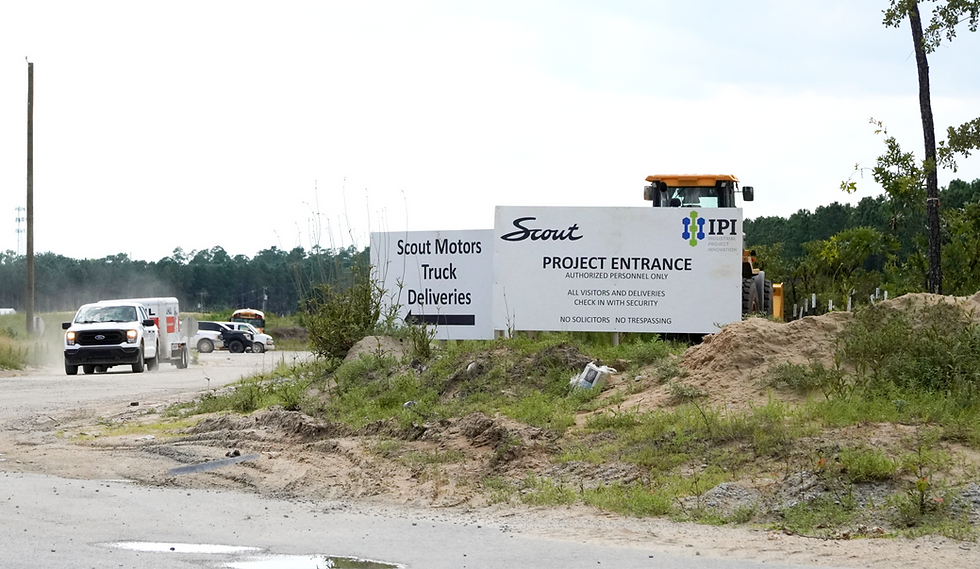A County at a Crossroads: Richland County's Budget Woes
- CUBNSC

- May 23, 2025
- 3 min read

By Javar Juarez | Columbia, S.C.
In Richland County, South Carolina, the fiscal year 2026 budget has become a flashpoint for debate—and a case study in how short-term windfalls can obscure long-term vulnerabilities. The county, home to over 400,000 residents, is now staring down the consequences of what some see as years of financial misdirection. The record tells a sobering story: economic development incentives ballooned, social investments stagnated, and public safety spending surged to meet the consequences.
At the center of this fiscal vortex is the much-lauded $322.8 million Scout Motors incentive—a one-time economic development package designed to bring electric vehicle manufacturing to Columbia. The deal, backed aggressively by the state and championed locally, created a 308% spike in Richland County’s operating grant revenue. But that figure is deceiving. The Scout grant, along with a deferred $23.6 million drawdown of American Rescue Plan funds, provided a temporary revenue boost without building sustainable reserves. Most of the funds passed through to project costs or infrastructure owned by outside entities.
The County's FY2024 Comprehensive Annual Financial Report shows this clearly: despite the massive influx, the Federal & State Grants Fund still ran a $6.1 million deficit. The General Government and Public Safety spending jumped 59%, but social services remained at just 6% of all governmental activity. These budget priorities are consequential. Roughly 17% of Richland residents live in poverty—well above the national average. Health disparities and violent crime remain persistent, particularly in underinvested neighborhoods.
Rather than shifting course, the FY2026 proposed budget doubles down on law enforcement:
The Sheriff’s Department budget swelled to $54.5 million, with $46.4 million dedicated to personnel.
The Alvin S. Glenn Detention Center, despite staffing and safety issues, is set to receive over $43 million.
The Special Duty Program and School Resource Officer Program were reauthorized with automatic fund carryover provisions, effectively shielding them from deeper scrutiny.
Meanwhile, affordable housing received a $4 million carryover from FY2024—a paltry sum given the county’s mounting eviction crisis and stagnant wage growth. Community-based social programs received less than a tenth of the law enforcement budget.
The public backlash is growing. At the May 6, 2025 council session, a flood of "community partners" filled the chamber—not to protest but to posture for funding. Organizations like the Columbia Ballet and the International Festival sang praises of the council's dedication while residents grappled with rising utility rates, stagnant incomes, and property tax hikes.
Those hikes are real. With multiple school districts proposing millage increases, and county-level hikes on the table to cover rising insurance premiums, employee compensation, and debt service, the average resident could see property taxes increase significantly. For a home assessed at $100,000, just a 12-mill increase translates to an additional $48 annually.
Yet these tax increases may not result in a stronger community. They may instead prop up a cycle: economic incentives that do little to build local wealth, followed by public safety budgets that expand to manage the fallout from poverty and neglect.
As Richland County emerges from the sugar high of its one-time grants, its fiscal strategy must evolve. Policymakers face a stark choice: continue prioritizing policing over prevention, or pivot toward investments in housing, health, and economic mobility that can create real, equitable prosperity.
The numbers don’t lie. And unless Richland County finds the courage to invest where it matters most, the cost of its current course will only rise—in dollars, in disparity, and in the futures of the communities it was elected to serve.
Richland County FY 2024 Auditors Report
Richland County FY2025 Proposed Budget



this county council is among the worse. they put all their eggs in one basket and have the gaul to walk around like they really did something. These folks don't know what they doing at all. Those smug looks on their faces and overly confidence attitudes aren't going to help in this election. We are tired of them and misdeeds. The current chair has inflated her own opportunities and like her wealth and Derrek Who? that fat bastard don't even come to our neighborhood.